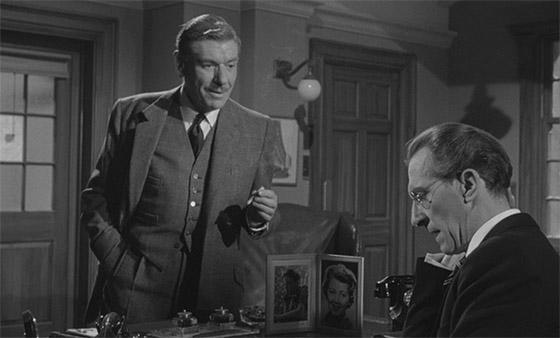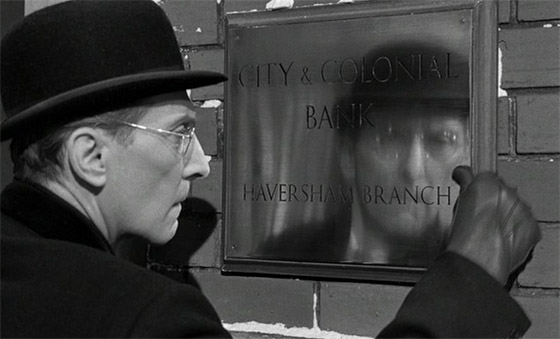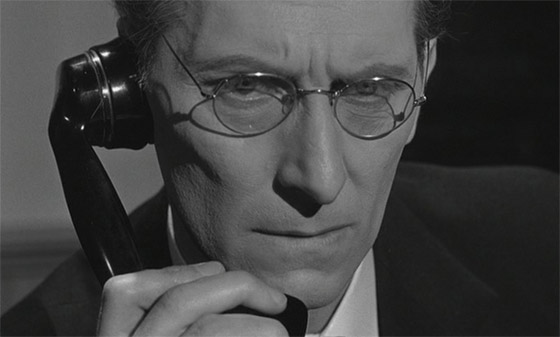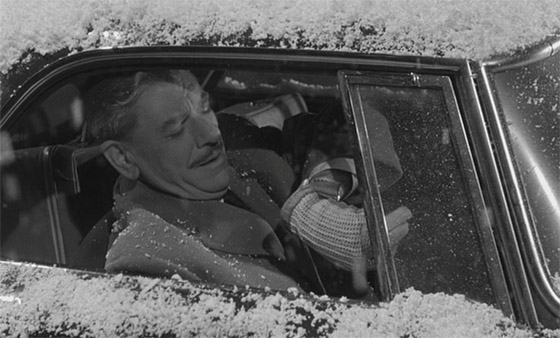
For Cash on Demand (1962), Hammer Films took on Charles Dickens for a modern “Christmas Carol” – one delivered as a nail-biting heist thriller. Peter Cushing stars as our Scrooge stand-in, Fordyce: a cold-hearted bank manager who casually bullies and threatens to terminate his constantly-terrified staff. The film takes place on a snowy December morning, and convincingly unfolds in something close to real-time. While the opening credits roll, and tense music plays (by Wilfred Josephs), the camera roves about the empty bank offices and down the steps toward the basement vault, studying every nook and cranny of the building: what will essentially be the only stage in the action. Then the employees begin to arrive, including the kindly Mr. Pearson (Richard Vernon, A Hard Day’s Night), Fordyce’s first in command; the efficient Mr. Sanderson (Norman Bird, Burn, Witch, Burn); young and flirtatious Sally (Lois Daine, Hell is a City) and Peter (Barry Lowe, The Camp on Blood Island); and Ms. Pringle (Edith Sharpe, Satan Never Sleeps). When Fordyce arrives, all joy is efficiently siphoned from the building. He immediately shows disapproval that Ms. Pringle has displayed some Christmas cards on her desk. “Banking is one of the few dignified business left in the world, Ms. Pringle. Do you mind terribly if we keep it that way?” “I’m sorry, sir,” she says, and removes the cards. He then berates Pearson for the state of a pen with a corroded tip, blaming him for not keeping it in tip-top shape. “It obviously hasn’t been cleaned or examined in weeks. This isn’t a post office, you know!” The madness continues: Peter is almost fired because a customer was overpaid ten pounds (even though the customer discovered the error and returned the money); and because Pearson tried to cover for his mistake, he’s accused of embezzlement. Pearson, weary of the constant conflict brought to bear by his manager, asks for transfer to another branch. Fordyce quickly responds, “Do you really think I could recommend you to another branch?”

Fordyce (Peter Cushing) obsessively polishes the bank's plaque on his way to work.
By now, the audience should sufficiently loathe mean Mr. Fordyce; and they should probably expect that he’ll be visited by three ghosts in the evening. But here the screenplay by David T. Chantler and Lewis Greifer (from a play by Jacques Gillies) takes an abrupt turn: into the bank arrives the commanding Colonel Hepburn (André Morell, who was Watson to Cushing’s Sherlock in 1959’s The Hound of the Baskervilles), who immediately overturns Fordyce’s authority by claiming to be from the “head office of the Home and Mercantile Bankers’ Insurance,” the insurance company in charge of the branch’s security. In fact, it’s a minor bit of business, but one of the very first things Hepburn does is reverse an order by Fordyce – he asks Pearson to stay in the office for a few minutes longer and close the door; Fordyce, who isn’t accustomed to being undermined, shows alarm. But it’s just the opening salvo in what will become an increasingly strained relationship. When Pearson leaves the room, convinced that Hepburn will be spending his time at the bank overseeing a thorough inspection, Fordyce takes a call from his home, and learns that his wife and child are being held hostage. She begs her husband to do everything Colonel Hepburn says. And so the bank robbery begins.

Cushing takes a panicked call from his wife, held hostage by Col. Hepburn's accomplices.
At just 80 minutes, Cash on Demand is a short programmer, meant to play on double-feature bills, but it’s an efficient, deeply satisfying suspense film. With its limited sets, the story’s stage origins are plainly evident (the furthest we get from the bank’s confines are the snow-covered street and sidewalk just outside the front door), but this also plays to Hammer’s strengths, relying upon masterful staging (by television director Quentin Lawrence) and compelling performances, in particular our two leads: most of the film is just Cushing and Morell alone, as Morell, with a steely gaze and a menacing smile, issues his orders, and Cushing, stripped of his precious authority, is psychologically beaten into submission. As a viewer, our sympathies shift; at first we feel some schadenfreude to see Fordyce reduced to a quivering mess. But Morell’s plan is executed so flawlessly – and Fordyce is so unresisting (since his family is in mortal danger) – that we anxiously await something, anything to expose Colonel Hepburn to the staff or to authorities. Gradually we see some suspicion in Pearson’s eyes. He gets on the phone to make a casual inquiry into Hepburn’s credentials. Time begins to run out, and Hepburn heads out the door with his bags of cash. The suspense may be handled more subtly than Hitchcock, but it works, all leading to an understated but gripping climax that runs with Fordyce-style efficiency. Cushing and Morell both had distinguished careers in British film, but they’ve rarely been as good as they are in this modest little thriller.

André Morell as the sinister Colonel Hepburn.
The film is available as part of an indispensable 3-disc, 6-film DVD set from Sony, Hammer Films: The Icons of Suspense Collection. Released in early 2010, the set (the third in a series of Hammer “Icons” collections from Sony) spotlights the British studio’s thrillers of the late 50’s and early 60’s, many of which had previously languished in obscurity. Cash on Demand is one of the gems of the collection; but so is The Snorkel (1958), Never Take Sweets from a Stranger (aka Never Take Candy from a Stranger, 1960), and, best of all, Joseph Losey’s The Damned (aka These are the Damned, 1963). Seek it out.









